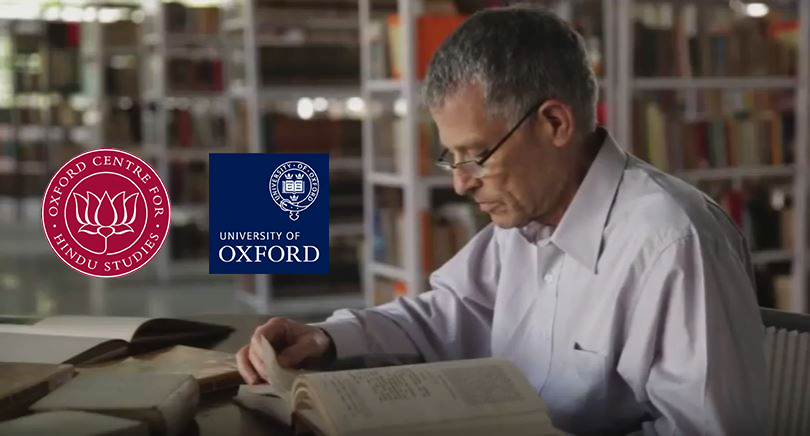Below You will find some of my presentations, classes and interviews as audio or video. I hope You will find them interesting.
Video
Audio
Cow Care in Hindu Animal Ethics. Kenneth R. Valpey. Palgrave Macmillan, 2020
/in Cow care project, ReviewsBy: Supratik Sen
Drawing upon a wide range of Hindu textual resources and thinkers, Valpey’s work explores our moral obligation to animals, and by extension, the non-human world. Valpey approaches the subject by focusing on a “constructive” approach to the ethics of what he terms “cow care”, the practice of keeping and caring for cows throughout their natural lives (Valpey, 2020, p. xvi). He uses the term bovinity to capture the pan-Hindu notion that cows are more than animals and are, in an important sense, privileged beings and therefore worthy of special reverence, care, and protection. Valpey writes that his treatise primarily functions as “an extended commentary” to the Bhagavad Gītā’s (5.18) characterization of a wise or well-educated person as one who sees all living beings with “equal vision”, and through his multi-faceted scriptural exegesis, he endeavours to highlight the implications of this worldview for animal ethics (Valpey, 2020, p. 3). Admittedly, Valpey’s book is a “wide-ranging overview” (Valpey, 2020, p. 5) of a sprawling topic; nonetheless, it makes a significant contribution to the burgeoning discipline of Hindu animal ethics (and Hindu ethics) for four reasons.
Read the whole Review [PDF]: Cow Care in Hindu Animal Ethics. Kenneth R. Valpey. Palgrave Macmillan, 2020
Are There Lessons from India about the Management of Cattle? A Review of ‘Cow Care in Hindu Animal Ethics’ by Kenneth R. Valpey
/in Cow care project, ReviewsBy: Clive J. C. Phillips
Curtin University Sustainability Policy (CUSP) Institute, Curtin University, Kent St.,
Bentley, WA 6102, Australia; clive.phillips@curtin.edu.au
Simple Summary: Cattle production has received significant criticism, particularly in Western countries, on account of its contribution to environmental pollution; the ethics of practices such as premature slaughter, particularly of male calves, and invasive procedures to control reproduction and dock tails and horns; and the poor welfare of cows in industrialised farming systems. However, in the country with the largest cattle population in the world, and one of the largest human populations, India, there is a culture of respect for cows, which has a long historical tradition. This culture is now growing to ensure that all cows are treated ethically. In his recent book, ‘Cow Care in Hindu Animal Ethics’, Kenneth Valpey describes the widespread advantages of such an approach, including a recognition that all beings are equal under a divine presence. The adoption of the Indian approach to cow care on a broader scale is considered, and it is recognised that whilst it generally provides for cow welfare and ethics better than Western farming systems, the adverse effects on the environment would be potentially magnified.
Read the whole Review [PDF]: Are There Lessons from India about the Management of Cattle? A Review of ‘Cow Care in Hindu Animal Ethics’ by Kenneth R. Valpey
INDIA’S BOOK OF WISDOM; The Bhagavata Purana | Full Documentary
/in Bhagavata PuranaIndia’s Book of Wisdom—The Bhāgavata Purāṇa
The Oxford Center for Hindu Studies Presents
The Bhagavata Purana is considered the crown jewel of the Hindu sacred ancient Sanskrit
literature known as the Puranas. The Bhagavata Purana is a bhakti (devotional)
scripture focused on the life and activities of Lord Krishna.
As a major source of the living bhakti tradition in India, it is essential to understand
this text to understand India’s culture of bhakti, art, literature and festivals.
This 60-minute feature documentary focuses on the January 2017 International Bhagavata Purana Conference held in Chennai, India, where prominent Bhagavata scholars assembled to discuss this Sanskrit classic.
Here we explore the ancient and contemporary life of this multi-faceted work with the documentary’s host, Dr. Kenneth Valpey, co-director (with Prof. Ravi M. Gupta) of the Bhagavata Purana Research Project of the Oxford Centre for Hindu Studies.

The scholars who took part in this feature documentary are:
Prof. Graham M. Schweig, Christopher Newport University, Virginia
Prof. Nanditha Krishna, Writer and Historian, C.P. Ramaswami Aiyar Foundation, Chennai
Prof. Ravi M. Gupta, Charles Redd Professor of Religious Studies, Utah State University
Prof. John Stratton Hawley, Barnard College, Columbia University, New York
Hanumatpresaka Swami, Founder and General Secretary of North American Institute for
Oriental and Classical Studies, Peru
Dr. Anand Venkatkrishnan, Assistant Professor, History of Religions, The University of
Chicago
Prof. Barbara Holdrege, Department of Religious Studies, University of California, Santa Barbara
Shaunaka Rishi Das, Director of Oxford Center for Hindu Studies (OCHS), Oxford UK

Cow Care in Hindu Animal Ethics. Kenneth R. Valpey. Palgrave Macmillan, 2020
/in Cow care project, ReviewsBy: Supratik Sen
Drawing upon a wide range of Hindu textual resources and thinkers, Valpey’s work explores our moral obligation to animals, and by extension, the non-human world. Valpey approaches the subject by focusing on a “constructive” approach to the ethics of what he terms “cow care”, the practice of keeping and caring for cows throughout their natural lives (Valpey, 2020, p. xvi). He uses the term bovinity to capture the pan-Hindu notion that cows are more than animals and are, in an important sense, privileged beings and therefore worthy of special reverence, care, and protection. Valpey writes that his treatise primarily functions as “an extended commentary” to the Bhagavad Gītā’s (5.18) characterization of a wise or well-educated person as one who sees all living beings with “equal vision”, and through his multi-faceted scriptural exegesis, he endeavours to highlight the implications of this worldview for animal ethics (Valpey, 2020, p. 3). Admittedly, Valpey’s book is a “wide-ranging overview” (Valpey, 2020, p. 5) of a sprawling topic; nonetheless, it makes a significant contribution to the burgeoning discipline of Hindu animal ethics (and Hindu ethics) for four reasons.
Read the whole Review [PDF]: Cow Care in Hindu Animal Ethics. Kenneth R. Valpey. Palgrave Macmillan, 2020
Are There Lessons from India about the Management of Cattle? A Review of ‘Cow Care in Hindu Animal Ethics’ by Kenneth R. Valpey
/in Cow care project, ReviewsBy: Clive J. C. Phillips
Curtin University Sustainability Policy (CUSP) Institute, Curtin University, Kent St.,
Bentley, WA 6102, Australia; clive.phillips@curtin.edu.au
Simple Summary: Cattle production has received significant criticism, particularly in Western countries, on account of its contribution to environmental pollution; the ethics of practices such as premature slaughter, particularly of male calves, and invasive procedures to control reproduction and dock tails and horns; and the poor welfare of cows in industrialised farming systems. However, in the country with the largest cattle population in the world, and one of the largest human populations, India, there is a culture of respect for cows, which has a long historical tradition. This culture is now growing to ensure that all cows are treated ethically. In his recent book, ‘Cow Care in Hindu Animal Ethics’, Kenneth Valpey describes the widespread advantages of such an approach, including a recognition that all beings are equal under a divine presence. The adoption of the Indian approach to cow care on a broader scale is considered, and it is recognised that whilst it generally provides for cow welfare and ethics better than Western farming systems, the adverse effects on the environment would be potentially magnified.
Read the whole Review [PDF]: Are There Lessons from India about the Management of Cattle? A Review of ‘Cow Care in Hindu Animal Ethics’ by Kenneth R. Valpey
INDIA’S BOOK OF WISDOM; The Bhagavata Purana | Full Documentary
/in Bhagavata PuranaIndia’s Book of Wisdom—The Bhāgavata Purāṇa
The Oxford Center for Hindu Studies Presents
The Bhagavata Purana is considered the crown jewel of the Hindu sacred ancient Sanskrit
literature known as the Puranas. The Bhagavata Purana is a bhakti (devotional)
scripture focused on the life and activities of Lord Krishna.
As a major source of the living bhakti tradition in India, it is essential to understand
this text to understand India’s culture of bhakti, art, literature and festivals.
This 60-minute feature documentary focuses on the January 2017 International Bhagavata Purana Conference held in Chennai, India, where prominent Bhagavata scholars assembled to discuss this Sanskrit classic.
Here we explore the ancient and contemporary life of this multi-faceted work with the documentary’s host, Dr. Kenneth Valpey, co-director (with Prof. Ravi M. Gupta) of the Bhagavata Purana Research Project of the Oxford Centre for Hindu Studies.
The scholars who took part in this feature documentary are:
Prof. Graham M. Schweig, Christopher Newport University, Virginia
Prof. Nanditha Krishna, Writer and Historian, C.P. Ramaswami Aiyar Foundation, Chennai
Prof. Ravi M. Gupta, Charles Redd Professor of Religious Studies, Utah State University
Prof. John Stratton Hawley, Barnard College, Columbia University, New York
Hanumatpresaka Swami, Founder and General Secretary of North American Institute for
Oriental and Classical Studies, Peru
Dr. Anand Venkatkrishnan, Assistant Professor, History of Religions, The University of
Chicago
Prof. Barbara Holdrege, Department of Religious Studies, University of California, Santa Barbara
Shaunaka Rishi Das, Director of Oxford Center for Hindu Studies (OCHS), Oxford UK